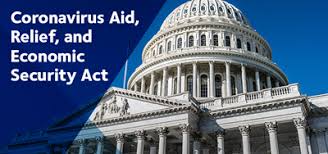
The CARES Act for Individuals and Families
The following is a summary of parts of the CARES Act passed by Congress on March 25, 2020 and is not meant as tax or financial advice, it is for information purposes only.
Last week, the US Government passed the CARES Act in response to the Coronavirus outbreak. Trying to read and understand the CARES Act is like trying to smell the number 13. Therefore, I am going to attempt to explain what I believe the number 13 smells like in this case.
The CARES Act is broken up into Parts called Divisions; there are 6 Main Divisions:
- Small Business Interruption Loans;
- Relief for Individuals Families, and Businesses;
- Assistance to Severely Distressed US Economic Sectors;
- Health Care Response for Coronavirus;
- A Guarantee to Money Market Mutual Funds; and
- Budgetary Provisions
In this summary I will focus on Division B of the CARES Act which applies to financial assistance for Individuals and Families.
The Financial Rebate
- If you have a Social Security Number, are not a dependent of another person, and make less than $75,000.00 you are eligible for:
- a one-time $1,200.00 payment.
- a married couple’s payment is doubled to $2,400.00 as long as the total marital income is less than $150,000.00.
- a person filing as Head of Household must make less than $112,500.00.
- This applicable income is determined by one’s 2019 return adjusted gross income, and if not filed, your 2018 return (AGI).
*If you have not filed your 2019 return, and it will show less income than your 2018 return, it is recommended you quickly file your 2019 return.
2. If you make between $75,000 and $99,000.00 ($150,000.00 and $198,000.00 for married), your rebate is reduced by $50.00 for every $1,000.00 in income you earn over $75,000.00 or $150,000.00.
Ex.: If you are single and earn $90,000.00 you would receive $450.00; if married and earn jointly $180,000.00 you would receive $900.00.
3. If your income from the most recently filed tax return makes you ineligible for the rebate, but you lost your job in 2020 due to the Coronavirus, when you file your 2020 Federal Tax Return, eligibility for the rebate under the CARES Act will be based on your 2020 income.
4. If you receive a rebate based on your most recently filed tax return, but your 2020 income shows you received too much of a rebate, you will not have to pay anything back.
5. If you fall within the eligible income thresholds, you are eligible for a $500.00 credit for each child/dependent.
- The child/dependent must be under 17 years old; children in college do not qualify parents for this extra rebate.
- If you had a child in 2019, but have not yet filed your 2019 return, you will not be eligible for the $500.00 credit since your eligibility will be based on your 2018 tax return.
- If you are divorced, only the parent claiming the child on his or her tax return is eligible for the $500.00 rebate for that child.
2019 Tax Return Filing and Payment of Taxes
1. Filing your 2019 tax return and paying any taxes owed has been extended until July 15, 2020
2. All required estimated tax payments are not due until October 15, 2020.
Retirement Fund Disbursements and Loans
- If any of the following apply to you, rules for Retirement Distributions and Loans have been temporarily amended:
- You are diagnosed with Coronavirus.
- Your spouse or dependent is diagnosed with Coronavirus.
- You suffer financially from Coronavirus due to being quarantined, furloughed, laid off, have work hours reduced, or cannot work due to lack of child care; or due to closing or reduced hours of a business owned or operated by the individual.
2. Retirement Fund Distribution changes:
- There will be no 10% penalty on early withdrawal of retirement funds up to $100,000.00 for a Coronavirus related distribution.
- The required minimum distribution amount for 401(k), 403(b), and 457(b) plans, as well as individual retirement accounts is waived.
3. Retirement Fund Loan changes:
- For the 180-day period after the enactment of the CARES Act, the maximum loan amount is raised from $50,000.00 to $100,000.00.
- Repayments may be delayed for up to one year.
Unemployment Insurance Amendments
1. For unemployment insurance, the CARES Act increases the State payment by $600.00 a week for up to 39 weeks, which is a temporary 13-week expansion provided by the Federal Government.
2. Creates eligibility for the self-employed and “gig workers.”
Charitable Giving Deduction Expansion
1. If you itemize your tax deductions on Schedule A of your federal return, rather than taking the Standard Deduction, the limit of 60% of your adjusted gross income (AGI) for any cash donations has been raised to 100% of your adjusted gross income.
For more information on the CARES act, please see the full bill at:
https://www.congress.gov/bill/116th-congress/senate-bill/3548/text
Tomorrow I will discuss the impacts on Paid Leave and the Family Medical Leave Act through the recently enacted Families First Coronavirus Relief Act (FFCRA).



